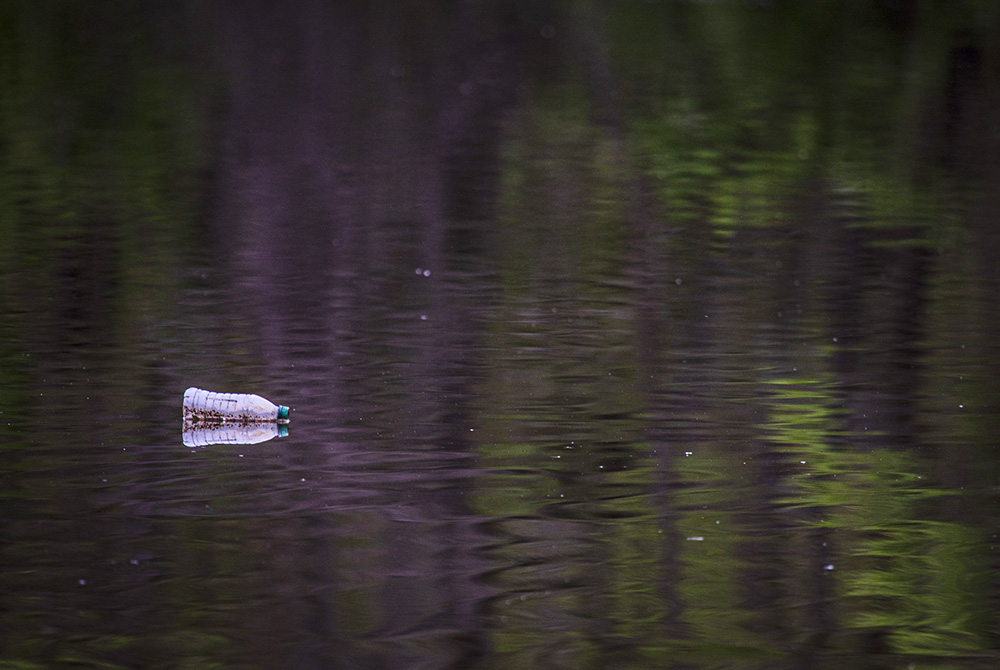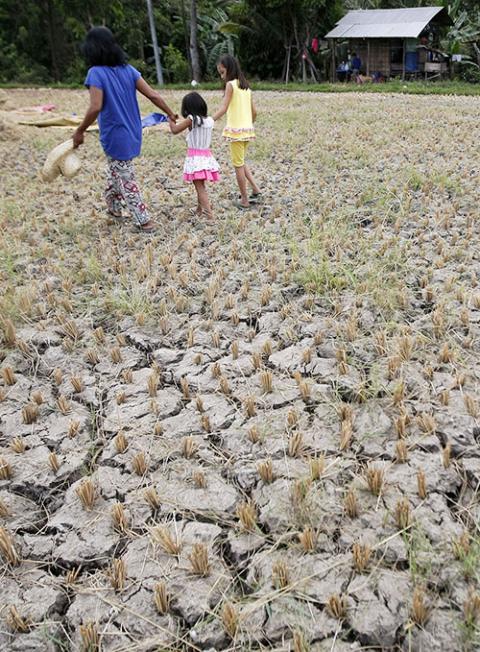
A discarded plastic bottle floats in the Anacostia River in April 2020, near Bladensburg, Maryland. (CNS/Chaz Muth)
Journalism in the United States is more a drumbeat than a narration.
Important stories come in one of two types:
First, there are the ones that come and go, shock or entertain, surprise or delight us. These are the quick ones, the ones we search the headlines for day after day. Just to find out what's going on.
We share the cloudy details at suppertime. We recount them at family picnics. We forget the names of the characters involved but we cherish the core of the story. They bring a message or a lesson or a promise or a fear.
They become the colors of our lives: yellow for exciting, red for violent, blue for sad, green for successful, purple for fear.
But they're short. They go away quickly. We treat them as irritations or interruptions or promises of a better or even more uncertain tomorrow. They become the background noise of what it means to be alive now. They describe our world or our concerns but, most of all, they have very little to do directly with us. They are short narratives that save us from dull and uninteresting. Like UFOs, or more political, the coral reef in Australia.
The second kind of journalism in modern society is very different than that. These are the stories that seem to never go away. Day after day, television news shows update yesterday's slow, slow stories that inch through our lives a moment at a time. But these are the stories that count.
For instance, this one was written in the 12th century by St. Hildegard of Bingen, a German Benedictine abbess who saw the sacredness of the land as a manifestation of the creator. As she captures in her concept of viriditas, or "greening," we need to be aware of the power of God under our feet. She writes:
Gaze at the beauty of earth's greenings.
Now, think.
What delight God gives to humankind
with all these things.
All nature is at the disposal of humankind.
We are to work with it. For
without we cannot survive.
Well, the point of today's story is now that 12th-century consciousness is a bigger story than ever.
These kinds of long-inching issues are the underlying current of our lives. These are the stories about COVID-19 and vaccines, about voting rights and elections, about the weather and climate change. These are the stories we get tired of hearing about. These are the stories that threaten all of us whether we like it or not, know it or not, or do anything whatsoever to influence their outcome ourselves.
Advertisement
These are the really big stories, the ones, we are sure, are way over our heads and so ignore most of them.
And therein lies the problem. What we are not fixing is only getting worse. And if it doesn't undermine our own lives, it will affect the lives of the next generation. It will certainly affect the lives of our grandchildren.
Which is where climate change comes in.
This is the kind of story that we forgive ourselves for not listening to. It's just too large for the size of us. "Nothing I can do about it all — except hope that someone else does, of course."
Americans have two ways of dealing with stories like this. We yawn. Or we count on technology to solve the problems even though technology has had a great deal to do with causing it. At the time of the great gas shortage some years ago, for instance, I heard the man in the airplane seat behind me say to the man next to him, "Oh, don't kid yourself. This is just hype to justify their price raises. And even if it's true, they'll go into a lab next week and invent some kind of substitute." Ah, yes, American superiority wins again.
Not this time, not where climate change is concerned. This story takes as much immediate response just to keep up with the results of it, let alone to "solve" it.
But more than that, this great question is a moral one, not a political one at all. Not if you're a Christian. Not if you were raised on the Scriptures. This one is in our own spiritual DNA: It comes out of the lifetime mandate of what it means to be the human race. It comes directly from the Garden of Eden to humankind, "Be fruitful and multiply ... till the garden and keep it."
Right now, we are barely doing either. Family size has dropped. The globe is under unnatural assault. The birds of the air and the creatures of the sea are in danger. The development of the fruitfulness of the Earth is under attack. From us. Worst of all, the world we did not create, we are now able to destroy. And so we are.

A woman and children walk through a drought-stricken rice field in Cebu, Philippines in April 2016. (CNS/Reuters/Jay Rommel Labra)
For instance, the obvious is upon us:
The greenness of life is withering under the chemicals we have created to control and enhance it. The oceans are full of plastic particles that are infecting the fish, and the birds are dying by the millions for lack of habitat and migration routes. Grazing lands are drying up; desertification is a creeping global disease that triggers immigration everywhere. Species after species — including are own — are in danger, but we are sure it will be fixed in a lab somewhere in California. All of life can live without us. None of us can live without them.
Clearly, it is time we each find ourselves a path into this issue. Each of us. This is not a story we can either ignore or dismiss as political hype. On the contrary, we are late in coming to consciousness while we wait for the government or science to do our saving for us as we ignore the damage we are doing to ourselves.
Professionals in the field of "solving plastic" have written lists of ideas aimed at helping us find our own personal, private contribution to the cleanup and new creation of the Earth. For instance, they tell us to "get rid of the throwaway culture" by repairing things rather than replacing them. Or by buying higher quality furniture in the first place rather than buying the same things over and over again. Or how about by telling restauranteurs not to use plastic straws or cutlery that is littering the entire country.
The point is that as you and I get deeper and deeper into saving our little part of the globe, alternative energies will be imperative. Electric cars will be next on the list, too. Single-use plastics — the ones we throw away immediately — utensils, food containers, plates and packaging will disappear from society because we will not accept them anymore.
And suddenly we will find ourselves cleaning up the Earth for our grandchildren — and nothing will make you happier than that.
But unless we begin to respond in force, the oceans will go on dying. The forests will burn down. The land will dry up as irrigation from the snowless highlands thins out. The animal species that pollinate and control growth, that spawn and refresh the food chain, will become more and more scarce.
From where I stand, it looks like we are at the point again of Louis XV's "After me, the deluge." Pure chauvinism, narcissism, soul-less-ness, biological immorality.
The tragedy of it all is that it happened in our time. To us. Because of us. By us, for us, and with little or no attention to the creeping self-destruction of it all.
Pick one thing. Do it. And know then, that you were there in soul when the Scripture required us to "tend the garden and keep it." That's the real story. That's the drumbeat of creation. That's the one commandment we got in the garden. Oh, yes, and that other one: "Be fruitful and multiply." Which won't happen much longer if we don't soon join the revolution. Unless, that is:
Gaze at the beauty of earth's greenings.
Now, think.
What delight God gives to humankind
with all these things.
All nature is at the disposal of humankind.
We are to work with it. For
without we cannot survive.








